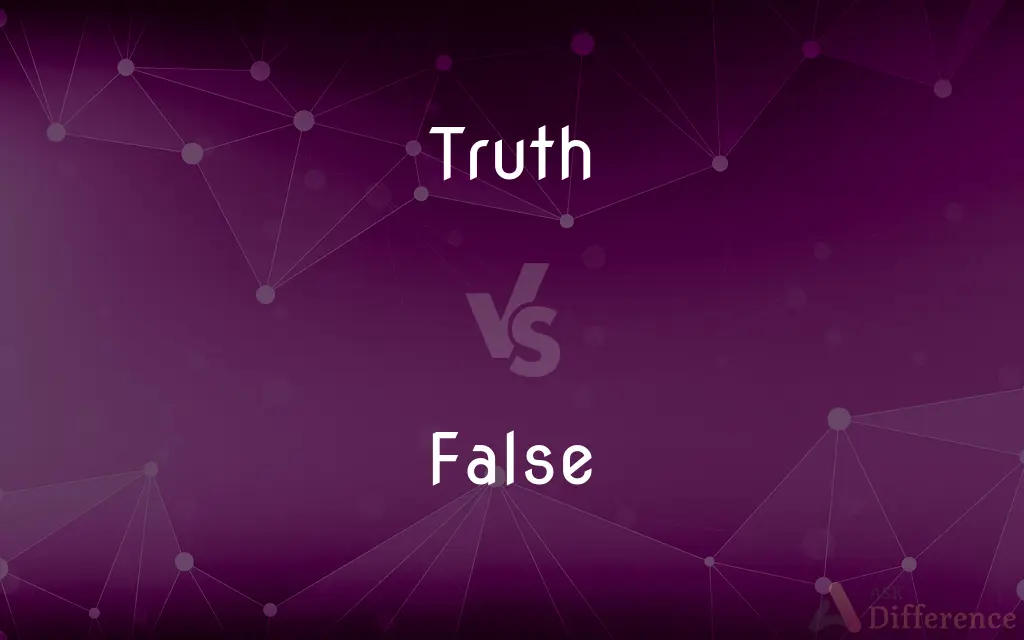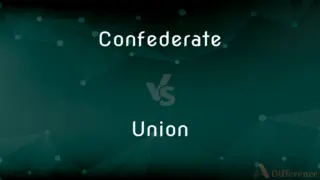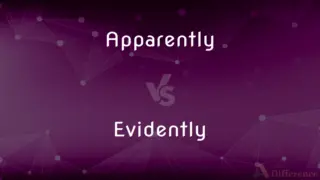Truth vs. False — What's the Difference?
By Maham Liaqat & Fiza Rafique — Updated on April 27, 2024
Truth refers to statements or beliefs aligned with facts and reality, emphasizing accuracy and veracity, while false refers to inaccuracies, misconceptions, or deliberate deceptions, highlighting error or dishonesty.

Difference Between Truth and False
Table of Contents
ADVERTISEMENT
Key Differences
Truth is typically defined as conformity to fact or reality, representing what is genuinely occurring or has occurred. It is often verified through evidence, observation, or logical consistency, forming the basis for knowledge and trust in various contexts. In contrast, false refers to something that is not correct, either by mistake or intentional deceit. Falsehoods can stem from misunderstandings, incorrect assumptions, or deliberate misinformation, often leading to confusion or mistrust.
In communicating truth, the objective is to relay information that is accurate and reliable, which can build and maintain trust among individuals or in society at large. It is crucial in areas such as science, law, and journalism. Conversely, communicating falsehoods, whether unintentionally or on purpose, can erode trust, spread misinformation, and cause significant societal and personal consequences.
Truth is often sought through rigorous methods such as scientific research, investigative journalism, or critical thinking, where confirmation and evidence are paramount. This pursuit ensures that conclusions are based on verifiable facts rather than assumptions or hearsay. On the other hand, falsehoods might proliferate through rumors, unchecked sources, or biased information, lacking rigorous verification and often appealing more to emotion than reason.
In legal and ethical contexts, upholding the truth is a fundamental value, seen as essential for justice and fairness. Lying or presenting false information in these settings can lead to legal penalties or moral condemnation. Whereas, the consequences of spreading falsehoods can extend to criminal charges, such as in cases of fraud or defamation, reflecting the serious nature of deceit.
The impact of truth is typically positive, fostering clarity, understanding, and informed decision-making. It is considered a cornerstone of effective communication and healthy relationships. In contrast, the impact of false information can be damaging, leading to misjudgments, conflict, and a breakdown in communication and relationships.
ADVERTISEMENT
Comparison Chart
Definition
Conformity to fact or reality
Not conforming to truth, incorrect
Objective
To relay accurate, reliable information
To misinform, either unintentionally or deliberately
Verification Method
Evidence, observation, logical consistency
Often lacks verification, can involve biased information
Impact in Communication
Builds trust, clarity, and informed decision-making
Can erode trust, lead to misinformation and consequences
Consequences
Positive impact on relationships and decision-making
Legal and social repercussions, potential harm
Compare with Definitions
Truth
Conformity to reality or actuality.
The truth of the matter was confirmed by video evidence.
False
Not according with truth or fact; incorrect.
The rumor about the celebrity was entirely false.
Truth
A fact that has been verified.
The truth about the moon landing is well-documented in historical records.
False
Intentionally untrue, deceitful.
He gave a false name to avoid detection.
Truth
A statement proven to be or accepted as true.
Scientists seek to uncover the truth through rigorous experimentation.
False
Based on mistaken ideas.
The false assumption that the sun revolves around the Earth persisted for centuries.
Truth
Real state of affairs.
The documentary aims to reveal the truth behind the political scandal.
False
Artificial or imitation, not genuine.
She wore a necklace of false pearls to the party.
Truth
Sincerity in action, character, and speech.
Her commitment to telling the truth was admired by her peers.
False
Unfaithful or disloyal.
His false friend betrayed his trust at the first opportunity.
Truth
Truth is the property of being in accord with fact or reality. In everyday language, truth is typically ascribed to things that aim to represent reality or otherwise correspond to it, such as beliefs, propositions, and declarative sentences.Truth is usually held to be the opposite of falsehood.
False
Contrary to fact or truth
False tales of bravery.
Truth
Conformity to fact or actuality
Does this story have any truth?.
False
Deliberately untrue
Delivered false testimony under oath.
Truth
Reality; actuality
In truth, he was not qualified for the job.
False
Arising from mistaken ideas
False hopes of writing a successful novel.
Truth
The reality of a situation
The truth is, she respects your work.
False
Intentionally deceptive
A suitcase with a false bottom.
False promises.
Truth
A statement proven to be or accepted as true
Truths about nature.
False
Not keeping faith; treacherous
A false friend.
Truth
Such statements considered as a group
Researchers in pursuit of truth.
False
Not genuine or real
False teeth.
False documents.
Truth
Sincerity; integrity
The truth of his intentions.
False
Erected temporarily, as for support during construction.
Truth
Fidelity to an original or standard
The truth of the copy.
False
Resembling but not accurately or properly designated as such
A false thaw in January.
The false dawn peculiar to the tropics.
Truth
Theology & Philosophy That which is considered to be the ultimate ground of reality.
False
(Music) Of incorrect pitch.
Truth
(Logic) The positive (true) truth-value.
False
Unwise; imprudent
Don't make a false move or I'll shoot.
Truth
True facts, genuine depiction or statements of reality.
The truth is that our leaders knew a lot more than they were letting on.
False
(Computers) Indicating one of two possible values taken by a variable in Boolean logic or a binary device.
Truth
Conformity to fact or reality; correctness, accuracy.
There was some truth in his statement that he had no other choice.
False
In a treacherous or faithless manner
Play a person false.
Truth
The state or quality of being true to someone or something.
Truth to one's own feelings is all-important in life.
False
Untrue, not factual, factually incorrect.
Truth
(archaic) Faithfulness, fidelity.
False
Based on factually incorrect premises.
False legislation, false punishment
Truth
(obsolete) A pledge of loyalty or faith.
False
Spurious, artificial.
False teeth
Truth
Conformity to rule; exactness; close correspondence with an example, mood, model, etc.
False
(logic) Of a state in Boolean logic that indicates a negative result.}}
Truth
That which is real, in a deeper sense; spiritual or ‘genuine’ reality.
The truth is what is.
Alcoholism and redemption led me finally to truth.
False
Uttering falsehood; dishonest or deceitful.
A false witness
Truth
(countable) Something acknowledged to be true; a true statement or axiom.
Hunger and jealousy are just eternal truths of human existence.
False
Not faithful or loyal, as to obligations, allegiance, vows, etc.; untrue; treacherous.
A false friend, lover, or subject;
False to promises
Truth
Topness; the property of a truth quark.
False
Not well founded; not firm or trustworthy; erroneous.
A false conclusion;
A false construction in grammar
Truth
(games) In the game truth or dare, the choice to truthfully answer a question put forth.
When asked truth or dare, he picked truth.
False
Not essential or permanent, as parts of a structure which are temporary or supplemental.
Truth
To assert as true; to declare; to speak truthfully.
False
Used in the vernacular name of a species (or group of species) together with the name of another species to which it is similar in appearance.
False scorpion (an arachnid)
False killer whale (a dolphin)
Truth
To make exact; to correct for inaccuracy.
False
(music) Out of tune.
Truth
To tell the truth.
False
To incorrectly decode noise as if it were a valid signal.
Truth
The quality or being true; as: - (a) Conformity to fact or reality; exact accordance with that which is, or has been; or shall be.
False
(obsolete) To violate, to betray (a promise, an agreement, one’s faith, etc.).
Truth
Conformity to rule; exactness; close correspondence with an example, mood, object of imitation, or the like.
Plows, to go true, depend much on the truth of the ironwork.
False
(obsolete) To counterfeit, to forge.
Truth
That which is true or certain concerning any matter or subject, or generally on all subjects; real state of things; fact; verity; reality.
Speak ye every man the truth to his neighbor.
I long to know the truth here of at large.
The truth depends on, or is only arrived at by, a legitimate deduction from all the facts which are truly material.
False
(obsolete) To make false, to corrupt from something true or real.
Truth
Fidelity; constancy; steadfastness; faithfulness.
Alas! they had been friends in youth,But whispering tongues can poison truth.
False
In a dishonest and disloyal way; falsely.
Truth
A true thing; a verified fact; a true statement or proposition; an established principle, fixed law, or the like; as, the great truths of morals.
Even so our boasting . . . is found a truth.
False
One of two options on a true-or-false test.
The student received a failing grade for circling every true and false on her quiz.
Truth
The practice of speaking what is true; freedom from falsehood; veracity.
If this will not suffice, it must appearThat malice bears down truth.
False
Uttering falsehood; unveracious; given to deceit; dishnest; as, a false witness.
Truth
Righteousness; true religion.
Grace and truth came by Jesus Christ.
Sanctify them through thy truth; thy word is truth.
He that doeth truth cometh to the light.
False
Not faithful or loyal, as to obligations, allegiance, vows, etc.; untrue; treacherous; perfidious; as, a false friend, lover, or subject; false to promises.
I to myself was false, ere thou to me.
Truth
To assert as true; to declare.
Had they [the ancients] dreamt this, they would have truthed it heaven.
False
Not according with truth or reality; not true; fitted or likely to deceive or disappoint; as, a false statement.
Truth
A fact that has been verified;
At last he knew the truth
The truth is the he didn't want to do it
False
Not genuine or real; assumed or designed to deceive; counterfeit; hypocritical; as, false tears; false modesty; false colors; false jewelry.
False face must hide what the false heart doth know.
Truth
Conformity to reality or actuality;
They debated the truth of the proposition
The situation brought home to us the blunt truth of the military threat
He was famous for the truth of his portraits
He turned to religion in his search for eternal verities
False
Not well founded; not firm or trustworthy; erroneous; as, a false claim; a false conclusion; a false construction in grammar.
Whose false foundation waves have swept away.
Truth
A true statement;
He told the truth
He thought of answering with the truth but he knew they wouldn't believe it
False
Not essential or permanent, as parts of a structure which are temporary or supplemental.
Truth
The quality of nearness to the truth or the true value;
He was beginning to doubt the accuracy of his compass
The lawyer questioned the truth of my account
False
Not in tune.
Truth
United States abolitionist and feminist who was freed from slavery and became a leading advocate of the abolition of slavery and for the rights of women (1797-1883)
False
Not truly; not honestly; falsely.
False
To report falsely; to falsify.
False
To betray; to falsify.
[He] hath his truthe falsed in this wise.
False
To mislead by want of truth; to deceive.
In his falsed fancy.
False
To feign; to pretend to make.
False
Not in accordance with the fact or reality or actuality;
Gave false testimony under oath
False tales of bravery
False
Arising from error;
A false assumption
A mistaken view of the situation
False
Erroneous and usually accidental;
A false start
A false alarm
False
Deliberately deceptive;
Hollow (or false) promises
False pretenses
False
Inappropriate to reality or facts;
Delusive faith in a wonder drug
Delusive expectations
False hopes
False
Not genuine or real; being an imitation of the genuine article;
It isn't fake anything; it's real synthetic fur
Faux pearls
False teeth
Decorated with imitation palm leaves
A purse of simulated alligator hide
False
Designed to deceive;
A suitcase with a false bottom
False
Inaccurate in pitch;
A false (or sour) note
Her singing was off key
False
Adopted in order to deceive;
An assumed name
An assumed cheerfulness
A fictitious address
Fictive sympathy
A pretended interest
A put-on childish voice
Sham modesty
False
(used especially of persons) not dependable in devotion or affection; unfaithful;
A false friend
When lovers prove untrue
False
In a disloyal and faithless manner;
He behaved treacherously
His wife played him false
Common Curiosities
How can one verify the truth of a statement?
Verifying truth involves checking facts, using reliable sources, and applying logical reasoning.
What role does truth play in science?
Truth is fundamental in science for building accurate knowledge and understanding of the world.
How can falsehoods be identified?
Falsehoods can often be identified through fact-checking, skepticism towards unverified claims, and critical analysis.
What is the importance of truth in society?
Truth is crucial for maintaining trust, transparency, and accountability in societal functions.
What are ethical implications of handling the truth?
Ethically, handling truth responsibly involves honesty, integrity, and considering the impact of truth on others.
Is it ever justifiable to withhold the truth?
In some cases, such as to protect privacy or prevent harm, withholding the truth may be considered justifiable.
What are common consequences of spreading falsehoods?
Consequences include loss of credibility, legal penalties, and potentially causing harm or panic.
Why is truth valued in relationships?
Truth builds trust and reliability, which are foundational to healthy and stable relationships.
How do cultures vary in their interpretation of truth?
Cultural perceptions of truth can vary, affecting communication styles, legal systems, and moral judgments.
What psychological factors influence belief in falsehoods?
Factors include cognitive biases, desire for simplicity, and emotional resonance.
Can truth change over time?
What is considered true can change with new evidence or understanding, especially in fields like science.
What is the difference between a lie and being mistaken?
A lie is an intentional falsehood, while being mistaken is unintentionally holding or spreading false beliefs.
How does technology affect the dissemination of truth and falsehood?
Technology can both facilitate the spread of accurate information and exacerbate the spread of falsehoods.
What legal measures exist to combat falsehoods?
Laws against defamation, fraud, and misleading advertising help combat the spread of falsehoods.
How do truth and falsehood affect decision-making?
Truth leads to better-informed and more effective decisions, while falsehoods can lead to poor and harmful decisions.
Share Your Discovery

Previous Comparison
Confederate vs. Union
Next Comparison
Apparently vs. EvidentlyAuthor Spotlight
Written by
Maham LiaqatCo-written by
Fiza RafiqueFiza Rafique is a skilled content writer at AskDifference.com, where she meticulously refines and enhances written pieces. Drawing from her vast editorial expertise, Fiza ensures clarity, accuracy, and precision in every article. Passionate about language, she continually seeks to elevate the quality of content for readers worldwide.
















































